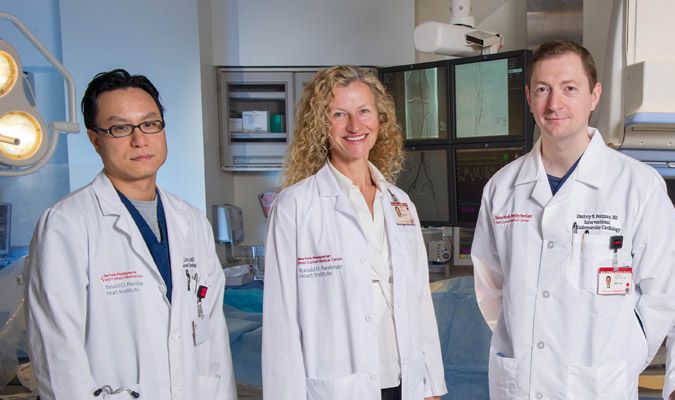Vascular Disease and Endovascular Treatment
At Weill Cornell Medicine, our specialists are board certified in vascular medicine, cardiovascular disease, and interventional cardiology. Our specialists have received extensive training, including a fellowship as well as additional specialization in complex vascular and endovascular procedures and are experts in diagnosing and treating abnormalities of the vascular/circulation system, including peripheral artery disease (PAD) and coronary artery disease (CAD).
What is Vascular Disease?
Vascular disease encompasses disorders of the body’s blood vessels that interfere with the normal flow of blood. The two of the main types of vascular disease are aneurysmal vascular disease and obstructive vascular disease. In aneurysmal vascular disease, the wall of a weakened blood vessel balloons out leading to the formation of blood clots, especially in the legs, or even ruptures. In obstructive vascular disease, the accumulation of fatty plaque in the walls of arteries (atherosclerosis) disrupts of the normal flow of blood through blood vessels leading to the increased risk for stroke and heart attack.
Further Areas of Expertise
When atherosclerosis blocks the coronary arteries, which carry blood to the heart, it is known as coronary artery disease. When the narrowing affects the carotid arteries, which carry blood to the brain, it is known as carotid artery disease. A significant number of patients with coronary artery disease may also suffer from peripheral artery disease - the narrowing of arteries that carry blood to other parts of the body, such as the kidneys, the legs, or the arms. For more information on our further areas of expertise and treatment options for PAD, renal denervation, and CAD, explore the links below.
Peripheral Artery Disease (PAD)
Explore our treatment options and areas of expertise for PAD.
Renal Denervation
Discover how we use renal denervation to treat resistant hypertension.
Coronay Artery Disease (CAD)
Learn more about CAD and the treatments options available.
Noninvasive Vascular Imaging
Vascular imaging is a non-invasive test that evaluates blood vessels to determine if blood is flowing throughout your body in a healthy way. To accurately diagnose abnormalities in the vascular system and help our specialists determine the best treatment approach for your optimal health and well-being, our specialists use the most advanced, contemporary noninvasive tests available. These tests use blood pressure cuffs, similar to those used to measure arm blood pressure, and ultrasound technology for arteries and veins, and can be conveniently performed during a regular office visit at the same location.
Our state-of-the-art vascular laboratory performs over 2,000 vascular studies annually and offers the full spectrum of non-invasive diagnostic modalities for the detection of vascular disease. Our laboratory is also accredited by the Intersocietal Accreditation Commission for Vascular Testing, which means our lab meets the highest standards of quality patient care and monitoring.
Our vascular imaging laboratory offers:
- Ankle-brachial index (ABI) test with segmental pressures/pulse volume recordings
- Exercise treadmill testing
- Pulse volume recording (PVR) test
- Arterial duplex ultrasonography of the carotid arteries, lower- and upper-extremity arteries, the aorta and renal arteries
- Venous ultrasonography of the upper and lower extremities
Our service also provides CT angiography (CTA) and magnetic resonance angiography (MRA) to ensure the most accurate diagnosis possible.
For more information about our vascular imaging service visit: Vascular Imaging & Testing | Weill Cornell Medicine
A Multidisciplinary Approach
At Weill Cornell Medicine our specialists offer a comprehensive, multidisciplinary approach to evaluating and caring for patients with vascular disease, including the use of advanced, minimally invasive endovascular treatment options.
Our goal is to create an individualized approach to diagnose and treat vascular diseases, improve your quality of life and prevent future vascular complications. All our vascular specialists are board certified in cardiology and will diagnose and treat associated cardiac conditions if necessary. Our team treats:
- Abdominal aortic aneurysm
- Carotid artery disease and stenting
- Chronic venous insufficiency
- Chronic limb-threatening ischemia (CLTI)
- Claudication
- Endovascular aneurysm repair (EVAR)
- Extremity atherosclerosis with intermittent claudication
- Hypertensive renovascular disease
- Ischemic ulcer of lower extremity
- Lower limb ischemia
- Peripheral arterial occlusive disease (PAOD)
- Peripheral artery disease (PAD)
- Peripheral vascular disease (PVD)
- Poor leg circulation
- Renal artery disease and stenting
- Renal denervation
- Resistant or uncontrolled hypertension
- Subclavian artery disease and stenting
- Varicose veins
- Venous ulcers
Personalized Treatment
As a patient at Weill Cornell Medicine your treatment is personalized to help you achieve your best possible health and well-being. Your treatment may include:
- Medical Therapy: Medical therapy is an integral part of treatment for all patients with peripheral arterial disease. Medications are used to target leg or arm discomfort, as well as treat risk factors - diabetes, hypertension and high cholesterol.
- Lifestyle Changes: Improvements in lifestyle are crucial for preventing future vascular complications. We help patients develop an exercise plan to help walk longer and faster without pain, quit smoking with our guidance and education, and make additional lifestyle changes -including diet and weight loss as needed.
- Minimally Invasive Endovascular Treatments: Our experienced interventional cardiologists specialize in performing minimally invasive procedures. These are performed through a small opening in the wrist or groin (not open-heart surgery), resulting in a shorter recovery period, same day discharge and fewer complications. Clogged arteries can be treated with balloon angioplasty, lithotripsy (use of shock waves to break down calcium), placement of stents, or atherectomy (plaque excision from the artery).
Schedule an Appointment
To schedule an appointment to see one of our physicians with expertise in vascular disease and endovascular treatment, please call (646) 962-5500.
If you are already an established patient, you may also request an appointment online using Weill Cornell CONNECT. We will make every effort to contact you within 24 hours.
Our staff is here to help coordinate your care. They will provide you with information on our physicians, their areas of expertise and help arrange for your visit and other testing when appropriate.
Often, imaging studies and vascular and cardiac testing will require a referral from your physician and, in some cases, pre-authorization from your insurance company. Our patient coordinators are skilled in this process and will assist you every step of the way. To schedule an appointment for vascular imaging, please call (646) 962-4733.
Our Physicians
| Faculty | Title | Phone | ||
|---|---|---|---|---|
 |
Dmitriy N. Feldman, M.D. |
Professor of Medicine, Director Endovascular Services | 646-962-5500 | Full Profile |
 |
Edwin Homan, M.D. Ph.D. |
Assistant Professor of Medicine | 646-962-5558 | Full Profile |
 |
Jaikirshan Khatri, M.D. |
Associate Professor of Medicine (Pending Appointment at Rank) , Director, Cardiac Catheterization Laboratories | 646-962-5500 | Full Profile |
 |
Luke Kim, M.D. |
Professor of Medicine, Director Interventional Cardiology Fellowship | 646-962-5500 | Full Profile |
 |
Nupoor Narula, M.D. M.S.c. |
Assistant Professor of Medicine, Director Cardiology Vascular Laboratory, Director Women's Heart Program | 646-962-4733 | Full Profile |


